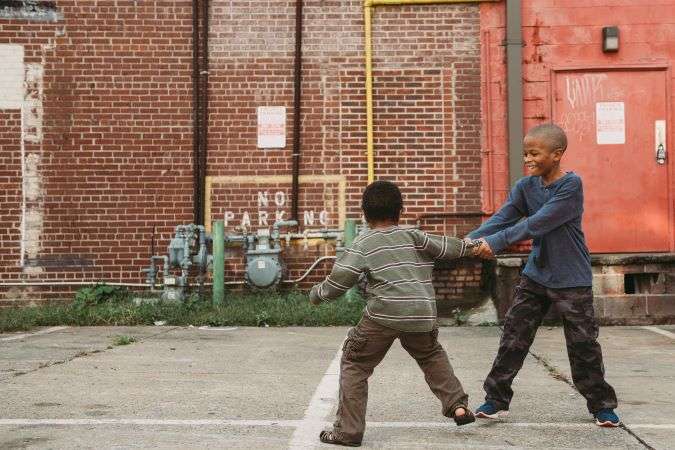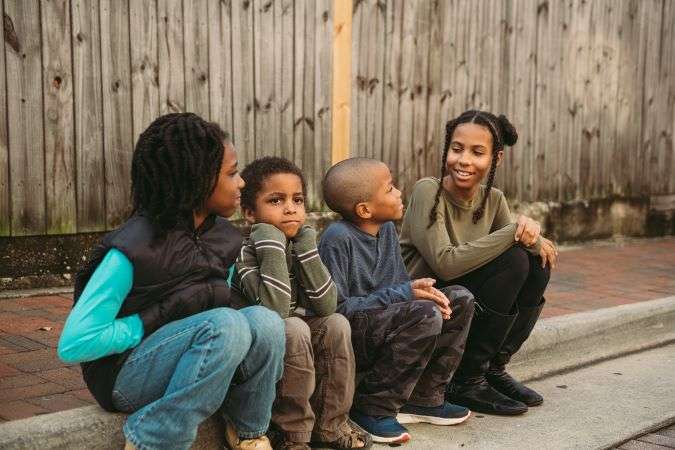 Sibling rivalry and your homeschool ~
Sibling rivalry and your homeschool ~
Written by Amber O’Neal Johnston from Heritage Mom
Growing up, I often felt like an only child, even though I had siblings. The age gap between us meant that while they were navigating adulthood, I was still a child, left to entertain myself and experience life in my own bubble.
I vividly remember watching other families where siblings played together, bickered, and then made up—just like on TV.
The camaraderie and companionship they shared filled me with longing, and I promised myself that when I became a mother, I would have a big family of kids who would be each other’s best friends.
But then reality hit. As my kids grew, they began bickering over the most trivial things—who got the orange popsicle, who got to sit in the front seat, who touched whose toy, who creased the pages of a book, who breathed too loudly. It was not the picture-perfect sibling bond I had imagined.
Instead, it often felt like I was refereeing a never-ending match of tiny disputes. Where was the loving, harmonious family I had envisioned and more importantly, what was I doing wrong?
I quickly learned that I wasn’t alone. Many moms feel disillusioned when their children fight. After all, we rarely post the squabbles and tantrums—the constant back-and-forth that’s inevitable in family life.
Instead, the world often sees sweet pictures of siblings hugging, smiling, and playing peacefully. But those snapshots are only a moment in time, not a complete story. The truth is, sibling rivalry is a normal, and even necessary, part of family dynamics.
If you’re feeling dismayed by your children’s frequent arguments, take heart. You’re not failing as parents. In fact, by guiding your kids through these tough moments, you’re giving them invaluable tools they’ll carry into adulthood.
The key isn’t to eliminate conflict but to teach them how to navigate sibling rivalry in healthy, constructive ways.
Things are by no means perfect in our home – we’re still growing, and some days are better than others – but here are some things that I have learned along the way that have helped foster stronger sibling bonds despite the squabbles.

Navigating Sibling Rivalry While Homeschooling
Give Them Space to Work Things Out
As much as we want to step in and mediate every disagreement, it’s crucial to give siblings space to resolve conflicts on their own. Not only does this teach them valuable communication skills, but it also fosters independence. Of course, there are times when you’ll need to intervene, but for smaller disputes, try stepping back and letting them work through the problem.
When you do intervene, avoid taking sides. Instead, focus on helping both parties express their feelings and find a solution they can agree on.
This neutral stance encourages empathy and understanding, rather than escalating the conflict.
I admit, this can be incredibly challenging. There are moments when I need to step away to clear my head—or calm down—before returning to help.
Sibling rivalry happens in all families, but homeschooling families experience it in a unique way.
Homeschooled children, especially when they’re young, spend nearly all of their waking hours together, which intensify these dynamics.
Celebrate Their Differences
It’s easy to fall into the trap of expecting siblings to be similar, especially when they share so much of their environment. But just because they’re raised in the same home doesn’t mean they’ll have the same personalities, interests, or needs.
Some children are naturally more sensitive, while others are more independent.
Some love to talk about their feelings, while others prefer to work through things internally. Help your children understand that it’s okay to be different and that those differences can actually strengthen their relationship. Encourage them to respect each other’s unique qualities, and remind them that they don’t have to be the same to love and support one another.
Model Healthy Relationships
Our children learn how to navigate relationships by watching us. If we model healthy conflict resolution, patience, and empathy in our interactions—whether with our spouse, friends, or even with them—they’ll be more likely to adopt those same behaviors. It’s not about being perfect, but about showing them that even in the midst of disagreement, love and respect can prevail.
If you, like me, imagined a harmonious, conflict-free family life with siblings who always get along, it’s easy to feel disheartened when reality doesn’t match the dream. But rest assured: sibling conflict is not a sign of failure, nor does it mean your children won’t grow up to be close.
Instead, it’s an opportunity for growth—for them and for you.
Over time, with guidance, patience, and a lot of love, those small, daily interactions (both the good and the bad) will weave together to create lasting bonds. And one day, we’ll look back and realize that even in the midst of the chaos, we were building something beautiful.
* Read more from Amber on Simple Homeschool here.
What’s Your Homeschool Mom Personality? Take Jamie’s quiz now and receive a free personality report to help you organize your homeschool based on what your personality type needs most!


 Toe-Dipping into Homeschooling
Toe-Dipping into Homeschooling